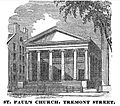Cathedral Church of St. Paul (Boston)
St. Paul's Church | |
 | |
| Location | 138 Tremont Street, Boston, Massachusetts |
|---|---|
| Built | 1819 |
| Architect | Alexander Parris Solomon Willard |
| Architectural style | Greek Revival |
| NRHP reference No. | 70000730 |
| Significant dates | |
| Added to NRHP | December 30, 1970[1] |
| Designated NHL | December 30, 1970[2] |
The Cathedral Church of St. Paul, Boston is the historic cathedral church of the Episcopal Diocese of Massachusetts. Located at 138 Tremont Street near Downtown Crossing, directly across from Boston Common and Park Street Station, the cathedral is adjacent to the diocesan offices. The current dean of the cathedral is Jep Streit. The church, designed by Alexander Parris and Solomon Willard and built in 1819, was the first Greek Revival church in New England, and was designated a National Historic Landmark in 1970 for its architectural significance.[3]
History
19th century
St. Paul's was founded in 1819 when there were two other Episcopal parishes in Boston, Christ Church (better known as Old North Church), and Trinity Church. Both had been founded before the American Revolution as part of the Church of England. The founders of St. Paul's wanted a totally American parish in Boston.

Unusually, at that time, for a church building, St. Paul's was built in Greek Revival architectural style. Its architects were Alexander Parris, best known for Quincy Market, and Solomon Willard, best known for the Bunker Hill Monument.[1] Its granite exterior and sandstone temple front have changed little since its construction. A carving of St. Paul preaching before King Agrippa II was intended to be placed in the pediment over the entrance, but was never executed.
Congregants included Daniel Webster.[4]
20th century
In 1912, after its neighborhood had become mainly non-residential, the diocese named St. Paul's as its cathedral. At this point its chancel was remodeled with a coffered and gilded half-dome, elaborately carved wood reredos, a chancel organ and choir benches. The new chancel's architect was Ralph Adams Cram, known for such landmark Gothic churches as All Saints', in the Ashmont neighborhood of Boston and the Cathedral of St. John the Divine in New York City.
From the 1880s until 1980, St. Paul's had a choir of men and boys who sang introits, hymns and anthems at Sunday morning worship services. Their founding choirmaster was Warren Andrew Locke, who was concurrently the organist and choirmaster at Harvard University from 1882 to 1910.[5] The choir's final organist and choirmaster was Thomas Murray, who later became University Organist and Professor of Music at Yale University.[6]
Ministers

- Sam Jarvis, 1820-1825[7][8]
- Alonzo Potter, 1826-1831[9]
- John S. Stone, 1832-1841[10][11]
- Alexander Vinton, 1842-1858[12][13][14]
- William Nicholson, c. 1860s[15]
- Treadwell Walden, c. 1870s[16]
- William Newton, 1877-1882[17]
- Frederick Courtney, c. 1880s[4]
Gallery
-
1851
-
Portrait of Treadwell Walden (photo 1860s)
-
St. Paul's, 19th century
-
c. 1881
-
probably 1908
-
2008
-
Informational commemorative plaque on the front of the church, 2008
-
Informational historical marker in front of the church, 2008
See also
- List of National Historic Landmarks in Boston
- National Register of Historic Places listings in northern Boston, Massachusetts
References
- ^ a b "National Register Information System". National Register of Historic Places. National Park Service. January 23, 2007.
- ^ "St. Paul's Church (Episcopal) (Boston)". National Historic Landmark summary listing. National Park Service. Retrieved 2008-02-05.
- ^ "NHL nomination for Cathedral Church of St. Paul". National Park Service. Retrieved 2015-02-24.
- ^ a b Bacon's dictionary of Boston. 1886
- ^ "Tablet Dedicated to Warren Andrew Locke, '69," The Cambridge Tribune, Volume XLV, Number 18, 1 July 1922.
- ^ "Thomas Murray," Yale School of Music website
- ^ Bowen's picture of Boston. 1838
- ^ Cyclopædia of American literature. 1858
- ^ Mark Antony De Wolfe Howe. Memoirs of the life and services of the Rt. Rev. Alonzo Potter, D.D., LL.D.: bishop of the Protestant Episcopal Church in the diocese of Pennsylvania. Lippincott, 1871 Google books
- ^ Homans. Sketches of Boston, past and present. 1851
- ^ "Stone, John S. (John Seely) 1795-1882 [WorldCat.org]". www.worldcat.org. Retrieved 2016-02-21.
- ^ New American Cyclopædia. 1868
- ^ New England historical and genealogical register, 1881 Google books
- ^ "Boston Pulpit". Gleasons Pictorial. 5. Boston, Mass. 1853.
- ^ Appletons' cyclopaedia of American biography. 1888
- ^ Who's who in America. 1899
- ^ Who's who in New England. 1915
Further reading
- King's hand-book of Boston. 1878
External links
- National Historic Landmarks in Massachusetts
- Episcopal cathedrals in the United States
- Episcopal churches in Massachusetts
- Churches in Boston, Massachusetts
- Churches completed in 1819
- 19th-century Episcopal churches
- Religious organizations established in 1819
- Churches on the National Register of Historic Places in Massachusetts
- Financial District, Boston
- Stone churches in Massachusetts
- 1819 establishments in Massachusetts
- National Register of Historic Places in Boston, Massachusetts
- Granite buildings









